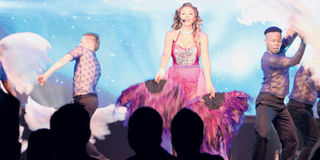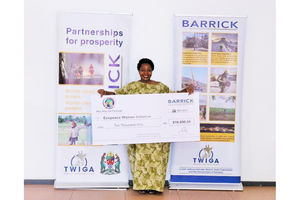the soft power that artistS wield

What you need to know:
- There was a great sense of expectation for the evening was set to be a must attend event for the Pan African guests who had come from almost every corner of the vast continent to converge at the Multi Choice content showcase. Later on in the evening as expected it is a full house and on stage Tanzania’s Diamond Platnumz is performing one of his popular records, ‘Number One’ and the audience is singing along.
The cool monsoon winds blew that made relaxing on the beach rather a fulfilling experience in Bel Ombre, Southern Mauritius after six days of rigorous routine.
There was a great sense of expectation for the evening was set to be a must attend event for the Pan African guests who had come from almost every corner of the vast continent to converge at the Multi Choice content showcase. Later on in the evening as expected it is a full house and on stage Tanzania’s Diamond Platnumz is performing one of his popular records, ‘Number One’ and the audience is singing along.
They can hardly tell what the Bongo Flava crooner is singing about but they just can’t help singing along , some brave ones later reach out to find out the meaning in the words.
This scenario is one that has repeated itself several times when Tanzanian musicians go beyond their borders with the latest being a show in Goma where a whole stadium was sold out. And such is the power of music as it connects people and sometimes even force people to learn new languages which on an ordinary day they wouldn’t have.
It is not a surprise that some refer to Tanzania, the country where great muscicians come from, for them that is the closest relationship.
They seem to be succeeding on frontier that men in suits and officialdom have failed in the solemn goal of promoting Kiswahili and Tanzania as a tourist destination by choice.
And this is nothing but the work of art as a form of ‘soft power’ something that former President Jakaya Mrisho Kikwete believes has not been put to good use given the popularity of these artistes.
They dominate playlists on both TV and Radio from Lagos to Dar es Salaam, however, what irks the President is that this continental dominance is not being put to good use to promote the country’s cause.
Two weeks ago, while addressing a packed audience at the Zanzibar International Film Festival 2017, the President reiterated the need for organisations to use artists as a marketing tool for their agenda.
In world where credibility has become such a scarce commodity, he believes artistes get that more easily than any other professional.
According to him artistes can navigate places where officialdom and diplomacy has failed because they connect directly with their fans especially in today’s world where technology has made the world a small place.
He gives the example of Michael Jackson’s concert in Moscow which was at the height of the Cold War era.
“When the Americans realised how the Russians loved Michael Jackson’s music, they allowed him to go and perform there and he brought the house down,” quipped Mr Kikwete who is a self confessed admirer of works of art.
According to Mr Kikwete there was more to gain than lose in embracing artists as ambassadors.
‘Soft power’ a term that was coined by Harvard’s Joseph Nye uses cultural and artistic appeal, ethical values, and foreign policies in order to convince people to join a particular cause.
Nye describes it as the ability to attract and win people over, rather than by coercion something that arts has been able to do for ages.
While the public sector makes a habit of institutionalising art through commissioning, purchasing and promoting it, it also gives it a strong educational character, using it to impose or maintain certain values and even social trends.
Contemporary art has played a key role in the widespread social campaigns against antiquated and bigoted mentalities that continue to somehow shape our society in the 21stcentury.
Mirrors today’s culture and society and it has the power to further shape the minds of younger generations to come – while art collectors and galleries thrive from the business of buying and selling works that typically don’t fit within a specific style, millennials follow it and absorb its underlying messages of tolerance and peace, both equally precious and highly valued today.
Contemporary art now incorporates digital mediums and has managed to blur the line between reality and fiction, with the help of surprising installations displayed in otherwise regular locations such as supermarkets, parks and the very streets we walk through every day.
And that’s where the soft power stems from: messages and ideas are no longer confined to the walls and glass boxes of museums, they’re out in the open for everyone to see and they speak to more than just art aficionados.
And they’re often regarded as political, social or ecological activists. Three months ago at the peak of the Dar es Salaam Regional Commissioner’s standoff with the media something rather bizarre happened, Ney wa Mitego released a rather controversial song titled Wapo.
The arts council swung into action, the song was banned but for some reason it was already being played by boda boda taxis riders.
The song drew widespread condemnation and praise in equal proportions; he was summoned by police and held for several hours in Morogoro before he was taken to Dar.
The messages in there were not very comfortable with some people in hierarchy; he had touched on some of the dark sides of our society.
It took the presidential intervention for him to walk free again.
Contemporary art as medium of expression speaks out against homophobia, against racism and intolerance; it challenges consumerism and it defends the rights of women and children worldwide; it calls out on corrupted politicians and authority figures, and it underlines the tragic outcomes of the capitalism that has come to shape our daily lives.
Ultimately, artists often end up saying things that even the mainstream media seems to forget – and the people listen. The people watch and they understand the message and in that way artists are bound to be portraying what Tanzania is more than what the cultural officials at Basata can do.
It is, therefore, no brainer that the Former President Jakaya Mrisho Kikwete thinks they have a role in promoting the Made in Tanzania Brand, one that is currently struggling.
A certain part of this article was taken from a publication by Coshamie



